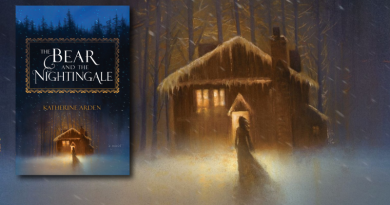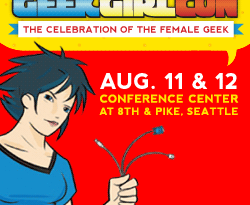Girls Can Be Heroes
Guest post by W. Scott
I am often asked how I deal with the fact that my sword-wielding armored hero is a 14-year-old girl. Skeptics are usually surprised by my answer.
It has only been recently that American readers have seen a new teenage female literary hero. Collins and Meyer re-introduced what apparently no other popular author has been willing to attempt since Nancy Drew in the 1930s: an epic story series with a teenage girl as the central protagonist.
What I have learned is that girls yearn for tales of heroism just as much as boys, and girls want to see themselves in those stories. What most authors have been unable to do, however, is express heroism in a female frame of reference. Girls demand explanations. They are not likely to ride off to battle just to hear the call of the horns echo from the castle walls. Boys, on the other hand, rarely need a reason to fight. They just need an opponent.
Once a girl knows the stakes and why she is fighting, you will never find a more ferocious ally. Even the Greeks understood this simple truth. Much of classic Greek philosophy relies on the concept of the conquering female hero. This is by no means a 21st century discovery.
The expression of heroism is particularly important in our culture. America is the land of opportunity, and many of those opportunities must be seized by people with an heroic dedication. Girls who have learned what it means to be heroic can be a formidable influence on the world around them. If they face opposition they can learn to overcome it, not through appealing to their traditional exclusion, but by confronting it squarely, and defeating it on its own terms.
In my stories, I put seven personalities up against some epic challenges, and I allow them to face them as authentically as possible as teenage girls. Jessica and her friends must learn to win, even if they are 110-pounds and five-foot-two up against a seven-foot-tall reptilian monster armed with an axe the size of the dinner table. I have been scoffed at, naturally, by those who believe that girls stand no chance in a straight-up fight. They state with certainty that a 14-year-old girl would be defeated instantly in nearly any fight where her opponent was not a bunny or kitten.
My response is to ask “who would win in a fight between a 240-pound heavyweight champion wrestler and a gorilla?” In the pause between that question and the inevitable stammering, I point out there is no such thing as a fair fight. Heroism is not about evaluating the chances of success, and it is not about guaranteed victory through brute strength. It is about facing defeat, and doing so with the utmost courage, because others are counting on you to win even if you don’t have an advantage. If there is one lesson my protagonist learns in my stories, it is that no matter what the circumstances, she must stand between evil and the innocent, even when others retreat.
The reason she fights is very simple. She would tell you that reason herself: “Because I’m a girl. And that’s what girls do.”
The other theme I examine in my stories is teamwork. This is something that I believe takes my stories a few steps beyond my contemporaries offerings, and it is a subject I believe is at least as important as any discussion of heroism.
American culture in the 21st century is replete with images of sour girls and women. The myth of the “conquering attitude,” as I call it, is a poisonous influence on both boys and girls. Girls are trained to believe that with a sufficiently aggressive and hostile demeanor, they will overcome their alleged rivals and become the most popular girl in whatever social context she participates in.
This supposedly entitles her to the most attractive boyfriend, invitations to the most exclusive parties and access to far more powerful fashion choices than other girls. One need only examine cultural offerings for girls to see this in action. How many television movies do we need about the Homecoming Dance?
Don’t get me wrong. The Homecoming Dance is important, but it should not be the central event in anyone’s life. When it is portrayed in the context of this universal competition among girls, where only the most hostile attitude can survive, it becomes destructive. And when the girls are destroyed (by themselves or each other), the boys soon follow.
We do nothing in our culture to encourage teamwork among girls. Boys are taught teamwork from an early age. We do this to give them a way to channel their aggressive instincts constructively (e.g. to keep them from beating each other up). We have made the mistake of believing that girls are not competitive or aggressive, so we abandon girls to fight amongst themselves, with predictable results. In other words, we let the girls beat each other up. Things do not need to be this way.
The hostile attitude culture dictates that only one girl can be Homecoming Queen, and that all other girls must be defeated in order for that to happen. I offer as counter-example the 2012 U.S. Women’s Olympic Gymnastics Team. Which is a more positive image? One girl wearing a crown surrounded by defeated classmates or a team of girls wearing gold medals re-affirming the fact without each other, none of them would be so decorated? I think the answer is obvious.
In my stories, I continually return to the theme of teamwork, primarily because each of my characters has both strengths and weaknesses which combine to make the team greater than the sum of its parts. We have all seen the power of teams of superheroes by now. The message of that teamwork and its value cannot be overstated. It is crucial to the positive self-image that we all agree is so important, especially to teenage girls who may be insecure and searching for their identities.
It is my sincere hope that the message of heroism and teamwork in my stories will be a positive influence on girls and the larger world around them.
W. Scott is the author of the LadyStar fantasy adventure book series available at http://ladystar.net. The story series has been in development for more than 13 years and now includes 21 titles, including both comics and fiction books. Copyright 2013 Palace in the Sky Productions LLC.
- How To Ride Rise of the Resistance - January 28, 2020
- Terrio and Rejwan Talk The Rise of Skywalker - December 23, 2019
- Star Tours Updated For The Rise of Skywalker - December 21, 2019










I never understood Homecoming. I think it was notable because I was part of or oversaw the Color Guard at the football game most years, but beyond that? I don’t even know what it is supposed to celebrate.
As for more relevant things…more to think about when I get to the second draft of “Not Enough to Be a Ranger”. Then again, I’ve been struggling to deal with a conflict that that the characters find themselves thrown into without explanation before taking gender politics into it, so maybe that’s not something new so much as increasing an existing priority. Ultimately, in my first draft I am much more concerned with the character arcs than the overarching plot.
I really loved this post. The idea that girls demand more explanation before going on quests, the bit about “there’s no such thing as a fair fight,” the problem society has where female aggression is usually associated with catty competition between women – This was a very clear, understandable, and moving post. Thanks!